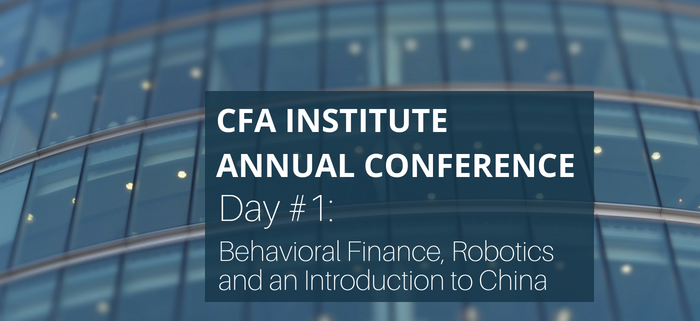CFA: Day #1 – Lift Off
Finally, the conference has taken off. There is no doubt that there are two major focuses on this year’s conference. The first is behavioral finance, or more accurate how to behave in finance. The second is insights into Asia and especially into China
By Kenneth Brandborg, Partner | The 14th of May 2018
The Quant of Stories
First on the agenda was ‘Wisdom of finance’. More or less a standard presentation from an academia having published a book, and now he is giving presentations there are basically an advertisement for buying the book. None the less there were a number of interesting points by Mihir A. Dessai. First of all, he claimed that the world is full of risk management and maximizing return. The finance industry does not stand out in that sense. The difference is the extreme focus on data, measuring and continuous evaluation of everything in finance. Nobody else gets that. In finance we don’t believe in stories, we believe in data. We try to quantify everything, not acknowledging that the universe is basically random, that we cannot explain everything with numbers. We need to expand our understanding of risk into broader definitions. Most have tried being corrected by a parent or a teacher. Behave! They say. Not being very specific, but still we were left with no doubt about how to behave, and how not to. So, when the FSAs all over the world are so micro quant oriented in describing how financial institutions should behave, why is it that we still have problems in the sector? Is it exactly because of that? Could it be better if the FSA just said ‘Behave!’. Has legislation become so micro managing, that the more generic and ethical aspects of behaving have been squeezed out? In that sense, the FSAs are part of the problem, not the solution. We have already seen unwanted aspects of the MiFID II legislation. Not adding to clarity and transparency but doing the opposite for the customers.
What to Do if You Need FinTech
FinTech is still on the agenda of the CFA Institute. Unfortunately, they kind of missed the target yesterday. A session on ‘Robot ethics and human-robot interaction’ could sound super relevant given the recent rise in roboadvisors, but it wasn’t. It was a very interesting session by Dr. Darling (yes, we could make about a million funny comments on that name, but I will leave that for now). The focus was on physical robots, and how we react to them. Quite interesting. My primary take from the session was that robots are very far from taking over the world. That was the good news of the day. The flip side of the coin is that maybe people (as in dictators or regimes) will use robots and AI to build weapons, so they can take over the world.
Introduction to China
My knowledge about China is limited at best, so it was quite interesting to hear the opening speech from Haiyan Wang, managing partner in China India Institute. It is quite cool that you by covering two countries cover app. 1/3 of the entire world population. The message was quite clear, and not that new. India and China will become larger and more significant economies. What was more disturbing was the things that weren’t said. First of all, I was left with the feeling that Mrs. Wang was very aware on what to say, and what not to say about China. She is US based, but it seemed that she still held back her own views, and only sited different Chinese leaders. Why I don’t know, but every time she pointed out a problem, she cited the solution given by Xi Jingping. The second subject not touched was how China and India will be able to double or even triple the per capita GDP on a sustainable way? Just imagine the extra consumption from 2.5 billion people on top of the pollution issues already present in the two countries. As she said: China has effectively put the US missiles out of use, because the US can’t find the Chinese cities underneath the smog. Funny – yes, but also very scary!
You can read Kenneth Brandborg’s initial thoughts before the CFA Conference kickoff here
Kenneth Brandborg, Partner
Kenneth, CFA charter holder, has worked in the financial sector since 2001 with focus on implementation and development of risk management, performance calculation and investment management systems within insurance, pension, banks, Capital Markets, as well as asset management.
Kenneth has broad business and system knowledge within Front, Middle and Back Office, with focus on risk- and performance measurement. Furthermore, Kenneth has several years of teaching experience on GDBA, BA, master and CFA courses.
Read more about Kenneth and our other CMP consultants here




